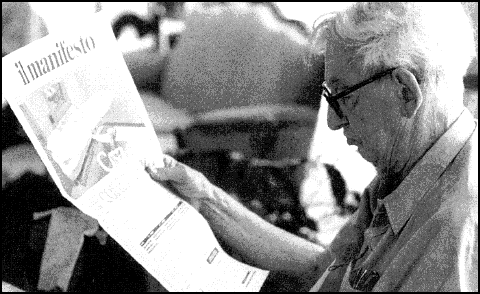The Shoah

We had no idea what dangers threatened the Jews. Nobody had, or could have. Even in the benighted pogrom-ridden corners of Carpathian Europe and the Polish-Ukrainian plains from which the first-generation immigrants came to Vienna, systematic genocide was inconceivable. In case of serious trouble, the old and experienced argued in favour of keeping a low profile, taking evasive action and staying on the right side of such authorities as were in a position to protect them, and might have an interest in doing so, or at least an interest in re-establishing law and order, however inequitable, on their domains.
The young and revolutionary called for resistance and active self-defence. The old knew that, sooner or later, things would settle down again; the young might dream of total victory (e.g. world revolution) but how could they imagine total destruction? Neither actually expected a modern country permanently to get rid of all its Jews, something that had not happened since Spain in 1492. Still less could one imagine their physical extirpation. Moreover, only the Zionists actually envisaged the systematic exodus of all Jews into a mono-ethnic nation-state, leaving their former homes, in the Nazi expression, 'judenrein'.
When people before --- or even in the first years of --- Hitler talked of the dangers of anti-Semitism, they meant an intensification of what Jews had always suffered: discrimination, injustice, victimization, the confident, contemptuous strong intimidating and sometimes brutalizing the minority of the inferior weak. It did not and could not yet mean Auschwitz. The word 'genocide' was not coined until 1942.
What exactly could 'being Jewish' mean in the 1920s to an intelligent Anglo-Viennese boy who suffered no anti-Semitism and was so remote from the practices and beliefs of traditional Judaism that, until after puberty, he was unaware even of being circumcised? Perhaps only this: that sometime around the age of ten I acquired a simple principle from my mother on a now forgotten occasion when I must have reported, or perhaps even repeated, some negative observation of an uncle's behaviour as 'typically Jewish'. She told me very firmly: 'You must never do anything, or seem to do anything that might suggest that you are ashamed of being a Jew.'
I have tried to observe it ever since, although the strain of doing so is sometimes almost intolerable, in the light of the behaviour of the government of Israel. My mother's principle was sufficient for me to abstain, with regret, from declaring myself konfessionslos (without religion) as one was entitled to do in Austria at the age of thirteen. It has landed me with the lifetime burden of an unpronounceable surname which seems spontaneously to call for the convenient slide into Hobson or Osborn. It has been enough to define my Judaism ever since, and left me free to live as what my friend the late Isaac Deutscher called a 'non-Jewish Jew', but not what the miscellaneous regiment of religious or nationalist publicists call a 'self-hating Jew'.
I have no emotional obligation to the practices of an ancestral religion and even less to the small, militarist, culturally disappointing and politically aggressive nation-state which asks for my solidarity on racial grounds. I do not even have to fit in with the most fashionable posture of the turn of the new century, that of 'the victim', the Jew who, on the strength of the Shoah (and in the era of unique and unprecedented Jewish world achievement, success and public acceptance), asserts unique claims on the world's conscience as a victim of persecution.
Right and wrong, justice and injustice, do not wear ethnic badges or wave national flags. And as a historian I observe that, if there is any justification for the claim that the 0.25 percent of the global population in the year 2000 which constitute the tribe into which I was born are a 'chosen' or special people, it rests not on what it has done within the ghettos or special territories, self-chosen or imposed by others, past, present or future. It rests on its quite disproportionate and remarkable contribution to humanity in the wider world, mainly in the two centuries or so since the Jews were allowed to leave the ghettos, and chose to do so.
We are, to quote the title of the book of my friend Richard Marienstras, Polish Jew, French Resistance fighter, defender of Yiddish culture and his country's chief expert on Shakespeare, 'un people en diaspora'. We shall, in all probability, remain so. And if we make the thought experiment of supposing that Herzl's dream came true and all Jews ended up in a small independent territorial state which excluded from full citizenship all who were not the sons of Jewish mothers, it would be a bad day for the rest of humanity --- and for the Jews themselves.
Eric Hobsbawm
©2003 Pantheon Books